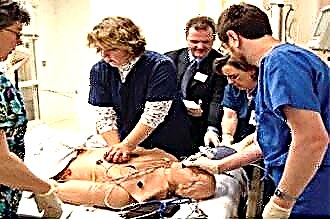Antibiotics are medicines of natural or synthetic origin that are used to treat bacterial infections. The components of antimicrobial agents inhibit the development or destroy pathogens, which contributes to the regression of inflammatory reactions. Should they be taken if tonsillitis develops?
 Angina or tonsillitis is an infectious-allergic disease characterized by the defeat of mainly lymphadenoid formations (palatine, pharyngeal tonsils) and the mucous membrane of the throat.
Angina or tonsillitis is an infectious-allergic disease characterized by the defeat of mainly lymphadenoid formations (palatine, pharyngeal tonsils) and the mucous membrane of the throat.
Pathology in 95% of cases is provoked by bacteria, which include beta-hemolytic streptococci, saprophytes, pneumococci, staphylococci, etc.
As part of medical treatment, antibacterial drugs are mandatory to eliminate them.
When antibiotics are needed
Can antimicrobials be taken for tonsillitis? Not all types of ENT disease need to be treated with antibacterial agents. In particular, catarrhal, viral and ulcerative-necrotic forms of pathology are treated without antibiotics. The main treatment regimen for diseases includes anti-inflammatory, antiviral, analgesic, regenerative and antihistamines.
The main principle of therapy for any form of tonsillitis is etiological. It is necessary to eliminate the causative agent of infection (etiotropic therapy) and only after that resort to the use of symptomatic and pathogenetic therapy. Serious complications can occur if the drugs are taken in a different order. Stopping the external manifestations of pathology without destroying the main causative agent of inflammation is fraught with the development of pyelonephritis, rheumatism, myocarditis, sinusitis, etc.
Features of antibiotics
When should you drink antibacterial drugs? You can not do without taking antimicrobial agents in the presence of purulent processes in the oropharynx and tonsils. Untimely elimination of foci of inflammation contributes to the chronicization of pathological processes, which can cause severe intoxication of the body and, accordingly, the development of sepsis.
Can I take antimicrobials myself? There are several groups of antibiotics, each of which is designed to eliminate specific types of pathogens. To determine the type of infectious agent, you need to be examined by a specialist. Only after receiving the results of bacteriological culture from the pharynx, the ENT doctor will be able to determine the optimal course of treatment of pathology.
Timely use of antimicrobial drugs contributes to:
- the destruction of pathogenic bacteria;
- detoxification of the body;
- facilitating the clinical manifestations of pathology;
- prevention of purulent-necrotic complications;
- reducing the likelihood of developing cardiac diseases.
If there is no improvement within three days after taking one group of antibiotics, they are replaced with drugs of a wider spectrum of action.
Indications for the use of antibiotics
Is it necessary to drink antimicrobial agents for angina? ENT disease is characterized by the rapid development of inflammatory reactions that must be stopped as soon as possible. Late therapy often causes catarrhal processes not only in the oropharynx, but also in the paranasal sinuses, middle ear and lungs. Direct indications for the use of antibacterial agents are:
- subfebrile and febrile fever;
- an increase in regional lymph nodes;
- purulent plaque on the tonsils;
- headaches and myalgia;
- absence of cough and runny nose.

Important! For the treatment of preschool children, mainly penicillins or macrolides are used, due to their low toxicity.
What medications can I take to eliminate pathogens in the pharyngeal mucosa? In the early days of therapy, broad-spectrum drugs are used to destroy pathogenic bacteria. Their components are active against several types of microbes at once, which significantly increases the chances of eliminating the pathogen.
The consequences of taking antibiotics
Antimicrobial medications can only be taken as directed by a specialist. Self-medication often leads to the development of complications that only exacerbate the patient's condition.
 In particular, non-compliance with the dosage and prolonged use of medications contribute to the following consequences:
In particular, non-compliance with the dosage and prolonged use of medications contribute to the following consequences:
- allergic reactions - itching, swelling of the nasal mucosa, hyperemia of the skin, the formation of vesicles;
- mucosal candidiasis - the formation of a white cheesy plaque on the walls of the mucous membranes, accompanied by itching and discomfort;
- intestinal dysbiosis - a violation of the microflora in the small intestine, as a result of which diarrhea, bloating, flatulence, etc.
Important! Medication overdose increases the risk of anaphylactic shock.
Abuse of antibacterial agents is fraught with a decrease in the reactivity of the body. This often becomes the reason for attaching a fungal flora to a bacterial infection, which greatly complicates the process of treating an ENT disease.
Post-infectious complications
Do you need antibiotics for angina? It is impossible to refuse antimicrobial drugs in favor of symptomatic drugs. Untimely destruction of the pathogenic flora is fraught with intoxication of the body. Saturation of blood and tissues with toxic substances can lead to the development of local and systemic complications. These include:
- paratonsillitis;
- phlegmon of the neck;
- acute otitis media;
- retropharyngeal abscess;
- sinusitis;
- labyrinthitis;
- myocarditis;
- meningitis;
- rheumatoid arthritis;
- pyelonephritis;
- dilatation of the ventricles of the heart.
 Complications can occur several weeks after a clear regression of inflammation in the oropharynx and tonsils.
Complications can occur several weeks after a clear regression of inflammation in the oropharynx and tonsils.
Systemic diseases are difficult to treat and can cause disability.
To avoid them, it is imperative to take antibiotics in the event of the development of bacterial flora in the mucous membranes of the ENT organs.
How should you take your medicine?
To achieve the complete elimination of the pathogenic flora in the foci of inflammation is possible only in the case of the competent use of antibacterial drugs. You need to know what drugs to drink for tonsillitis, in what dosages and with what they need to be combined. To achieve the maximum effect of antibiotic therapy, you need to consider the following nuances:
- before using the drugs, it is necessary to pass an analysis for the microflora in order to determine the causative agent of the infection;
- medications prescribed by a specialist can only be taken in the recommended dosages;
- in the presence of allergic reactions to medicines, notify the doctor;
- you cannot interrupt or prolong the course of treatment without the recommendation of a specialist;
- you can drink antibiotics an hour before or two hours after a meal;
- all medicines should be taken with non-carbonated water only.
To increase the reactivity of the body, in parallel with antimicrobial agents, it is advisable to take vitamins and immunostimulating drugs.
They prevent recurrence of inflammation, which prevents the development of severe complications.
Types of antibiotics
What antimicrobial agents can you drink to eliminate acute and chronic tonsillitis? According to the type of effect on the disease-causing cell, all antibiotics are divided into two types:
- bactericidal - destroy the cellular structures of microbes, which leads to their death;
- bacteriostatic - inhibit the reproductive function of bacteria, which prevents their development.

According to the chemical structure and the principle of action on the body, all antimicrobial drugs can be divided into the following types:
- penicillins;
- carbapenems;
- cephalosporins;
- macrolides;
- tetracyclines;
- aminoglycosides;
- lincosamides;
- chloramphenicol;
- polymyxins;
- sulfonamides;
- quinolones.
Self-combination of antimicrobial drugs can lead to body poisoning.
For the treatment of bacterial infections, only three groups of medications are often used: penicillins, macrolides, and cephalosporins. Their active components destroy most strains of bacteria that provoke the development of tonsillitis. In severe cases, quinolones and tetracyclines are included in therapy.
Penicillins
 When can you drink penicillins? Penicillins are a group of beta-lactam drugs that inhibit the synthesis of cell structures of gram-positive bacteria. They are used mainly for the treatment of catarrhal tonsillitis, characterized by the absence of purulent plaque on the tonsils. They have a wide spectrum of action, but often provoke allergic reactions. For this reason, penicillins in pediatric therapy are often replaced by macrolides, which rarely cause adverse reactions.
When can you drink penicillins? Penicillins are a group of beta-lactam drugs that inhibit the synthesis of cell structures of gram-positive bacteria. They are used mainly for the treatment of catarrhal tonsillitis, characterized by the absence of purulent plaque on the tonsils. They have a wide spectrum of action, but often provoke allergic reactions. For this reason, penicillins in pediatric therapy are often replaced by macrolides, which rarely cause adverse reactions.
Important! Penicillins cannot be combined with most antimicrobial drugs.
The features of penicillin drugs include:
- most often they are prescribed in the form of injections, which is due to the risk of destruction of their active components in gastric juice;
- used to kill predominantly gram-positive bacteria;
- not recommended for use in the development of bronchial asthma;
- when taken orally, they contribute to the disturbance of the intestinal microflora.
The most effective drugs include "Augmentin", "Sumamed" and "Flemoxin". As a rule, they are prescribed for the treatment of uncomplicated forms of tonsillitis, accompanied by a slight increase in temperature and signs of intoxication of the body.
Cephalosporins
Cephalosporins are drugs that are resistant to beta-lactamase enzymes of bacteria. Antibiotics are resistant to gram-positive and gram-negative bacteria. They are used if the use of penicillins in the treatment of tonsillitis is ineffective.
Cephalosporins are necessarily prescribed for the treatment of complicated forms of ENT disease.
 The active components of the drugs contribute to the destruction of the membranes of microbes, as a result of which they die. A decrease in the number of pathogens accelerates the healing process, which reduces the risk of chronicity of catarrhal processes.
The active components of the drugs contribute to the destruction of the membranes of microbes, as a result of which they die. A decrease in the number of pathogens accelerates the healing process, which reduces the risk of chronicity of catarrhal processes.
Due to their low toxicity and broad spectrum of action, cephalosporins are successfully used to treat purulent inflammation. However, an overdose of drugs can lead to a violation of the intestinal microflora and diarrhea. Among the best drugs of the cephalosporin series are Cefodox, Cefutil and Cefalexin.
Macrolides
Can I drink macrolides for tonsillitis? Macrolides are hypoallergenic antibiotics that do not cause side reactions. They are used to treat purulent infections not only in adults, but also in preschool children. Macrolide drugs help to eliminate complicated and chronic forms of ENT disease.
The distinctive features of drugs include:
- have antioxidant and antiphlogistic effects;
- prevent the development of pyelonephritis and rheumatism;
- easily carried by young children;
- extremely rarely cause nausea and headaches;
- create high concentrations of active substances in the foci of inflammation.
To eliminate pathogens and clinical manifestations of tonsillitis, drugs such as Azicid, Ilozon, Azitral and Klacid are used. Most of them can be used for 7-10 days in a row. Overuse of drugs can lead to a decrease in the body's resistance and the development of complications.



